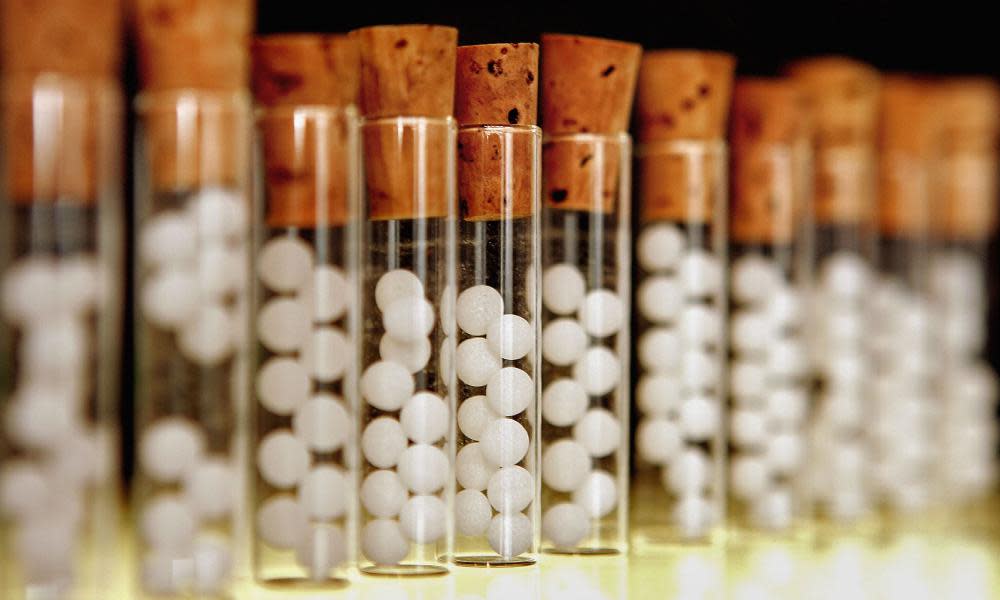Regulator could strip alternative medicine charities of their status

Charities that promote unproven treatments for sick patients could be stripped of their charitable status under proposals being considered by the UK government’s regulator.
The Charity Commission is reviewing how it decides which organisations qualify as charities – a status that brings authority as well as tax breaks – after it received complaints that some organisations make unfounded claims about complementary and alternative (CAM) therapies.
Hundreds of charities registered in the UK promote CAM therapies for all kinds of ailments, and while some interventions have demonstrable benefits – such as hypnotherapy for irritable bowel syndrome – many more are unproven.
The Commission has received more than 300 responses to a public consultation on the issue, which closes on Friday, with many submissions coming from charities themselves. The British Homeopathic Association, which believes that CAM charities are being unfairly targeted by the review, points out that doctors and nurses around the world use CAM therapies in daily practice because they believe they help patients.
But an investigation by Les Rose, a clinical science consultant with the charity HealthWatch, claims to have found that dozens of UK-registered CAM charities offered dubious advice to people. Some discouraged vaccinations while others promoted homeopathic remedies for serious illnesses or invited donations to treat people at a distance by transmitting “healing energy”.
“The assumption is that charities are regulated and the regulator will make sure that they are bona fide, but the regulator doesn’t do anything of the kind,” Rose told the Guardian. “The Commission has to give these charities notice that they will be expected to provide evidence for any claims they make and that they’ll be de-registered if they don’t do it.”
The Charity Commission already requires health charities to provide reliable evidence of their public benefit, but critics allege that these guidelines are not properly applied to CAM charities. To be registered as a charity, the benefits of an organisation’s work must outweigh any potential harms.
“The problem is that the Commission does not follow its own policy, which effectively allows organisations to promote unproven, disproven and even dangerous therapies under the respectable banner of charitable status,” said Simon Singh, founder of the Good Thinking Society, which threatened the Charity Commission with a judicial review if it failed to review CAM charities. In its own submission to the consultation, the Good Thinking Society calls for organisations that fail to provide good evidence for their therapies to “be removed from the charities register until such time as good evidence is available.”
Margaret Wyllie, chair of the British Homeopathic Association, said the Charity Commission’s guidance had served it well for years and that it had only launched the review “because of a legal threat from a small group of activists committed to depriving people of the choice of using CAM as part of their healthcare.”
“There is no evidence that demonstrates increased danger to anyone from using CAM, which would necessitate this consultation. While the Charity Commission must ensure that charities are not promoting therapies or lifestyles that cause harm, the evidence they should consider is that of public benefit and here CAM charities can point to the millions of people worldwide who regularly use these therapies and find them beneficial to health,” she added.
Doctors have reported cases where CAM therapies have proved harmful. These include infections, trauma and even death caused by acupuncture, and medical complications caused by herbal remedies being used alongside conventional medicines. They also raise concerns that patients might delay or completely avoid effective treatments and use unproven alternatives instead.
Another charity, Sense about Science, wants the Charity Commission to adopt a peer review system that draws on expertise from medical bodies such as the royal colleges to assess charities’ claims. “One of the reasons that quackery succeeds is because it wears so much of the garb of medicine and of legitimate medical charities,” said Tracey Brown, the charity’s director.
John Maton, head of charitable status at the Commission, said the regulator was aware of “the considerable public debate” around complementary and alternative medicines. “Our approach has been to seek a wide range of views to inform our future approach to CAM,” he said. “It is clear that there are strongly held but conflicting views on the types and level of evidence that should be required.”
The Commission expects to publish its analysis of the consultation in August and confirm any new policy in the autumn.

 Yahoo News
Yahoo News 
